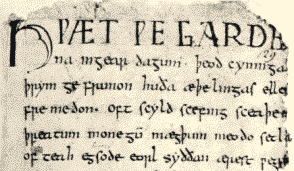Word Origins
What Word origins means and why bother about it?
English Language is made of borrowings from about 150 languages…...it was first brought to the land by Germanic tribes- Anglo, Saxons and Jutes. This why we have so many English words with Greek and Latin roots as prefix, suffix and many Scientific English words are derived from Latin and Greek.
The land was further taken over by French for about 100 years after the conquest of Normandy.there are a whole lot of words in English which are borrowed from e.g. Latin, French, Italian, Asia and Middle East in English Language.
In this period Norman French equated English language to the low worker to establish superiority of French language. Result being Church have records written in French!!!
Modern English era started with renaissance from 1500 to the present time.
Half the words we use today have roots in old English, yet old English looks so different from the present version.

--------------------------------------------------------------------------------------------------------
History of English Word Origin
English word origins in English language date as far as back as 5th Century or as some say old English spoken by Celts. Celts were the earliest dwellers of the British Isle and only few of Celtic or old English words have survived into Modern English today, words like Water and Be.
Some Latin words have remained unchanged in English language but, most have changed the way they were used in old English to the way the are used today.......See here how Latin and Greek words they were used in old English period to modern English time. Also check out these Latin words used in their original form...Latin Words and Latin Roots.
At present there are 125 dialects of English language. Phew!!!
Shakespeare alone invented 2000 unique words and catch phrase we still use
Why bother about word origins?
For the simple reason that large number of English words, around 80%, are borrowed from other countries and culture that came in contact with Britain.
Secondly, most words in Academic word List or vocabulary for advanced English have Greek and Latin roots as prefix, suffix used for numbers and for word formation.Therefore if you know the meaning of that word roots it will be easy for you to remember words for longer time.
Duc... to lead-------------- conduct, induce, produce, educate, deduct,
Mal...........Bad -------------Malnutrition/ Malpractice
Grat....... goodwill--- grateful, gratuity, gratis
Nov......... New-----------Novelty, innovate, novice, novel, renovate
In late middle ages and in renaissance both languages were associated with learning and prestige. This why we see in science vocabulary Geek and Latin roots and Greek and Latin root words are present in a large number.
|
Foreign Borrowings in English Language belt, plant, street (Latin), Rugby, Window, Seat (Scandinavia), bacon, accuse, basin (French), Balcony, Carnival, Opera (Italian), Cannibal, Mosquito ( Spanish/ Portuguese), Horde, Trousers( Europe), Jungle, Bungalow, Thug, Juggernaut ( India), Bamboo, Ketch up ( Asia), Caravan, Kiosk ( Middle East), Taboo, Zero, Voodoo ( Around the world) |
More words with Latin word roots: Corp........Body------- corpse, corpus, corps Culp........fault--- culpable, exculpate Oman..... ALL------------ Omniscient, Omnipotent,Omnivorous Retro.......Back------- Retrospect, Retroactive Retrograde. Graph....... pictured------telegraph, autograph, polygraph Mania .......Madness---- agromania, anglo mania, nymphomania Cide........ Kill----- pesticide, suicide, insecticide Tele..........Distance; Theo-----God; |
English language has been influenced by the culture and linguistic patterns of the people who came in contact with it.
Many countries that invaded Britain or settled there left their prints on this language...
Brief Summary of Word origins in different time Periods
Germanic (Before ca. 450)
Borrowings from Latin; Everyday words Germanic tribes used for daily activites.
Prehistoric English (ca. 450-700)
More borrowings from Latin used in Christianisation process.
Old English (700-1100)
More literary borrowings from Latin; and words from Vikings
Middle English (1100-1500)
Borrowings from French especially from Government, Military and Sophisticated Cultural lexemes
Modern English (1500- present)
Scientific vocabulary based on words borrowing from Latin Greeks, and countries English came in contact with ------Europe, Asia, Australia, Africa, and the America
Return from Word Origins to English Vocabulary

FREE E-BOOK-Latin and Greek Word Roots
Now download Right-click to download the PDF.Oxford English Dictionary publishes new word updates and revised word meanings, on March, June,September and December every year. For instance, in March 2012, it added:
bit bucket n. An An imaginary trash location, example, "it fell into the bit bucket" means the data was lost.
Click here Contact me for mailing you daily updates on new words
